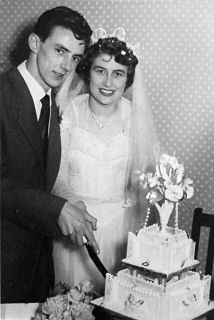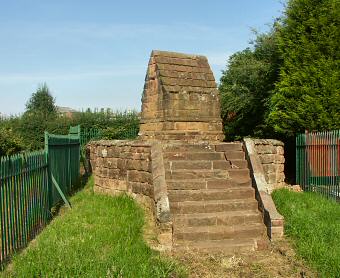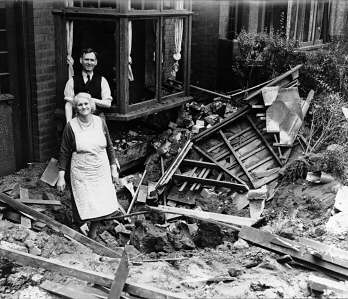|
Index...
|
Many thanks to Cathy Clapinson for sending in the memories of her parents, Brian and Jean....

On the 17th July 1954, Jeanne Hyde married Brian Richards. Jeanne was born at Lammas Road, Coventry, in 1931, and shares a few of her fond memories with us here....
 grew up in Lammas Road, Coventry, behind the Holyhead pub. Before the war, we used to go out on fishing trips in my dads Morris Cowley car, which was a big black thing with a running board. I wasn't allowed to run about in case I scared the fish!
grew up in Lammas Road, Coventry, behind the Holyhead pub. Before the war, we used to go out on fishing trips in my dads Morris Cowley car, which was a big black thing with a running board. I wasn't allowed to run about in case I scared the fish!
After the war started nobody went anywhere very much, although we did occasionally go out with the Holmes family (who we later lived with in Leek Wooton as evacuees), and the Coles family, who were friends of my Dad. We used to go on picnics, although goodness knows what we ate! We also used to drive over to Hunningham to see the Rootes family (although my Mum didn't like Albert Rootes, and said he was too crude). They had previously lived in Redesdale Avenue, but moved to Hunningham, and lived in a garage, which they made into a "bungalow". He used to service mowers and tractors. We would go down to the pub by the river. All of us kids used to sit in a little area in the bay window. It was literally a passageway. Nobody bothered to cater for childrens' amusements in those days. We also used to go for tea to Uncle Sid and Aunty Ethel Hyde's house at 18 St. Osburgs Road, Coventry.

I can remember every night, I used to go to bed and have "singing time". You couldn't sit up and read in the winter, as the bedroom was freezing!
Before the war, Dad used to bring a chicken home at Christmas, complete with feathers and innards, and I used to help pluck it. I remember having a stocking with an apple, and orange, three nuts and a lump of coal! I can't remember having presents, although we must have had one or two.
For our holidays, I remember we went to Rhyl every year, and then in 1939 we went MAD and went to Cornwall! We stayed in Zennor, and returned a few weeks before the war broke out. I didn't have another holiday then until 1948, when I went to Butlins at Skegness with my friend Joan Duckett.
I accepted the war as a way of life. As I was only 8 years old when it started, I really didn't understand what was going on. I was 14 when it finished, so most of my remembered childhood was wartime. I remember mostly the November Blitz, hearing machine gun bullets on the trapdoor exits in the shelter, and seeing our house in the morning when we went home, with all the windows broken, the roof missing, the front door lying in the hall, and the walls with big lumps of plaster missing.
My Dad used to pop home and make a pot of tea during the lulls in the air raids, and one night he walked into a lamppost in the blackout, and made a huge dent in the aluminium teapot. We used it like that for years! You just couldn't buy a new one. We used to go to the shelter every night at 7pm and go back home in the early hours of the morning. The shelters were actually just a series of passages shored up with posts. Planks lined the floor to save walking on wet earth. Plank seating and primitive bucket toilets with a curtain in front at each corner of the passageway. They were very damp, and if you sat in one place for long, you would need an umbrella, as the ceilings dripped constantly.
The worst aspect of the war for me was the rationing. We didn't really notice at the time, just in retrospect, that we never had so many things that we now take for granted. No tomatoes, and if any did get to the greengrocers, word would spread like wildfire, and all the women would rush to queue for 1/2lb! No bananas, no sweets for ages, and then a tiny ration every week. Sweets were still rationed in 1954 when I met my future husband, and we managed to find a little shop where the owner took pity on us and let us have extra rations! I never had ice-cream or iced-lollies until I was 16 years old.
I remember being told the difference in sound between a German and British plane, so that I could get to a shelter if necessary. I remember everyone had "Georgian" windows - all taped up in squares so that if you got bombed, the windows didn't shatter and cause more injuries. And I remember never being able to put the lights on unless you had blackout curtains. All the signposts throughout England had been removed too, so that should the Germans invade, they wouldn't be able to find their way about!! There were no lampposts lit anywhere, and even the cars and lorries had tiny slits for headlights. I remember everywhere being very very dark.
I never had any new clothes, except my Barrs Hill uniform. This could have been because my Dad was tight with his money, and not because of the rationing! That's probably what has made me a clothes-a-holic now! In all my childhood, I remember having Doris and Rita Carter's hand-me-downs, except for one dress and coat when I was 14, and even then I wasn't allowed the one I wanted, because it wasn't serviceable - my Mum said - as it was plain turquoise, and she made me have a navy dress with a pattern.

One strange thing I remember about the November 14th Blitz was that our curtains in the front room at Lammas Road were "outside" the window. The blast from the landmine on the Alvis Factory had flexed the window frames and sucked the curtain through the hinge side and then allowed the windows to go back, leaving the curtains outside. There wasn't any glass left in them either. I remember my Mum standing in the street crying. And I remember we had very heavy rain soon afterwards, and I was upstairs bailing water out of the bedroom window! Strange, because I can't imagine rain causing that amount of water - I wonder if we had burst pipes too?
My best friends were Margaret Scott and Mary Crompton. We were never allowed to play in their houses, but they loved to play in ours because my Mum let us do almost anything, and even joined in. We were always doing concerts with singing and dancing. Mum used to make us identical crepe paper dresses, and I used to get annoyed because Margaret was always more careful with hers and it always lasted longer than mine. We used to play "cashiers" with a piece of string tied from the window catch to the barley twist strut on the fireplace. We used to hang a jar on the string and use it like an old fashioned cash machine.
We also used to play in the Holyhead Pub grounds, getting in through a hole in the fence. It was thick with trees and shrubs. There were also fields at the bottom of Moseley Avenue, and Four Pounds Avenue was just a dirt track across to Allesley Old Road, with a small footbridge crossing the river. Lake View Park was a huge wild open space. The chain gardens were another big open space on the corner of Holyhead Road and Four Pounds Avenue. There were such a lot of places to play, and before the war started it seemed a very safe place for children.
Website by Rob Orland © 2002 to 2026